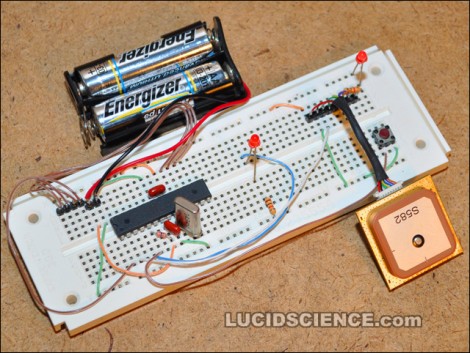
[Oneironaut] is trying out a new GPS module with the prototype seen above. It’s a San Jose Navigation device identified as FV-M8 and sold by Sparkfun for just under a hundred bucks. That’s it hanging off the bottom-right of the breadboard seen above. They’ve packed a lot of power into the small footprint, and made it very easy to control at the same time. Although the device is fully configurable, you can start grabbing serial data from it just by connecting a single data line, 3.3V, and ground.
[Oneironaut] tests it out by streaming the serial data to a character LCD screen, then comparing the output to his handheld Garmin GPS device. You can see him describe his ATmega32-based test platform in the video after the break. We’re used to seeing spy-tech for most of his projects and this will eventually join those ranks. He’s thinking of putting together a magnetic tracking module that plays nicely with Google Earth.
[youtube=http://www.youtube.com/watch?v=SoMaAdQsGSE&w=470]















you can get cheapy usb gps units from ebay for around 15 bucks. They tend to use serial to usb bridge chips so you can probably hook directly to the gps unit itself bypassing the usb if need be for a much cheaper price
yeah, $99.95 for a gps receiver is exorbitant. cool project though, would love to see it done with a cheap gps receiver.
Close to 100 bucks it is damn expensive for just a module.
Sure Electronics sells a very nice GPS+bluetooth evaluation board for 35$.
Thanks for posting my project!
Yes indeed, the FV-M8 GPS module is an expensive unit, but it is sure nice to work with. Gets a lock in 45 seconds (basement or car), and spews out NMEA strings at 5 per second. I did try the el-cheapo unit, but did not have much luck with it. This module beats my Garmin handheld!
I am going to try a GPS controlled all-terrain robot on my property this summer, so the fast rate and accuracy “should” keep my 500 pound robot out of the ditch.
Brad
Check out the modules from here for example: http://www.gtop-tech.com . They use very good chips by MediaTek and also offer 5Hz refresh rate etc.
I’ve made a test board for FGPMMOSL3 (paid 20$ per chip) and it is very simple and can be done with very few components. The chip can provide power directly to an active antenna which you can get for 5$ a piece. Also supports DGPS and everything else that particular module shows. Same sensitivity and accuracy.
So I don’t get the ridiculously powerful part in the Sparkfun text. And especially not that price.
Then if you look at the Gmm-u5LP from GlobalTop, 66 Channels -165 dBm Tracking (typical) and up to 10Hz refresh rate you are in bit different waters already.
Can someone explain why some GPS receivers advertise more than 16 channels? From the surface, you’ll only ever see say 12 satellites at most. A couple extra channels to track sats that should be coming into view soon maybe, but there aren’t even 66 in the entire constellation and probably never will be.
Not denying it’s probably a great receiver, but what’s up with this? Do the prospective buyers for this (ie. electrical engineers) really buy into that sort of claim?
GPS for “just under $100” is simply crazy! you can get new tiny GPS receiver for $10-$15 from http://www.m2m-com.com …
Having more channels can enable faster aquisition as there are more free channels to lock new satellites to. I agree that 66 is overkill and is not required.
Mainly I wanted to paste the sensitivity value on that particular chipset.
One good explanation I saw was: “The reason for 65 channels is the initial cold-start search when it has no idea where any satellite might be (or its doppler shift, etc.). There may only be a dozen needles ever visible, but they are scattered in a haystack with a thousand slots.”
When using AGPS this matters less.
It seems like everything on SparkFun is ridiculously overpriced. Like already said, you can source GPS modules for ~$15 elsewhere.
It would be a real hard case to make that the performance and quality difference (if any) makes up for the $85 price hike.
@Elias:
Ah that does make sense, thanks. Cold starts are obnoxiously slow on the 8-channel Motorola Oncore receivers I’ve been experimenting with in timing applications (10s of minutes sometimes, though my sky view is also pretty poor).
Idea is good, design not so good and definitely no value for money for this GPS module.
Any pointer where can I buy a device under hundred bucks having both the GPS and GSM modules (with a controller to run my program)
http://www.dl9sec.de/venus6/venus6.htm
$100 EVK board, $100 SDK.
20Hz out of the box, 10Hz from the SDK, but the chip itself has UART and I2C – I’ve just attached a J1850 ATTiny2313 via I2C from my harley so it emits private NMEA like messages.
where can I buy a device under hundred bucks